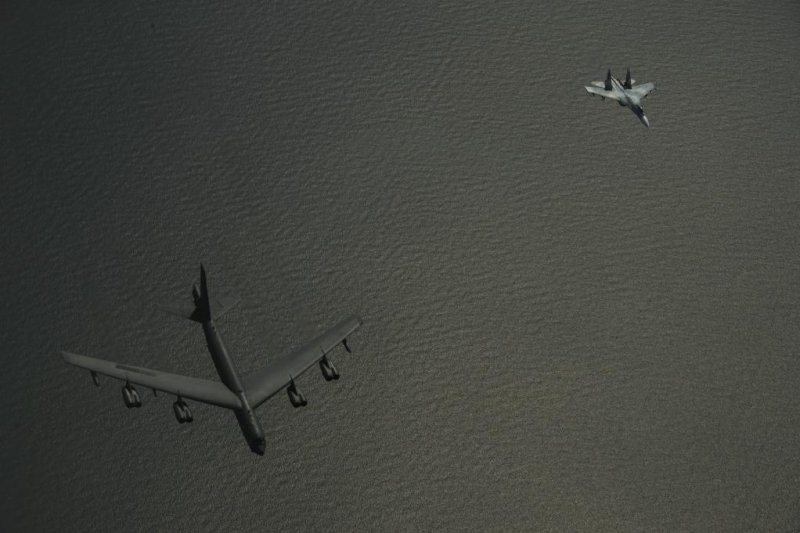B-52H Stratofortress being intercepted by a Russian SU-27 Flanker fighter over the Baltic Sea. U.S. Air Force photo
Aug. 2 (UPI) -- Boeing has received a $59.5 million task order for the B-52 Engineering Sustainment Program as part of its role in the Long Range Stand-Off missile development, the Department of Defense announced on Tuesday.
The work will be conducted at multiple locations with an expected completion date of Dec. 31, 2019, and $5 million in research and development funds already has been allocated.
The Long Range Stand-Off program is an Air Force initiative to replace the AGM-86 Air Launched Cruise Missile currently deployed on the B-52H Stratofortress strategic bomber.
The ALCM is currently the only nuclear-capable cruise missile in the U.S. inventory after the retirement of the TLAM-N Tomahawk. It's AGM-86B model can mount a W80 thermonuclear warhead with a yield of up to 200 kilotons.
The proposed LRSO replacement for the ALCM would be mounted on the B-52H, B-2 Spirit stealth bombers and the future B-21 Raider bomber currently under development, which is expected to be deployed by 2030.
There has been some controversy over whether the U.S. needs a new nuclear cruise missile in its inventory. Secretary of Defense James Mattis has been ambivalent on the need for the weapon in testimony regarding the Pentagon's Nuclear Posture Review.
"We're looking at each leg of the triad and we're looking at each weapon inside each leg," Mattis testified before a Senate subcommittee reviewing the Pentagon budget request last June.
"What I'm looking for is a deterrent that will be most compelling to make certain these weapons are never used."
Critics have questioned whether the weapon is really necessary given the estimated trillion dollar cost of modernizing the U.S. nuclear arsenal over the next several decades. Senator Dianne Feinstein has been a vocal critic of the LRSO and said so during Mattis's testimony.
"I do not see it as an effective deterrent weapon," Feinstein said.
"I see it as Russia taking action to counter it and with the cost and the fact that we've got new ballistic missile submarines, new bombers, new intercontinental ballistic missiles and new warheads, I wonder why we need to develop this specific weapon? The cost is going to be inordinate."















